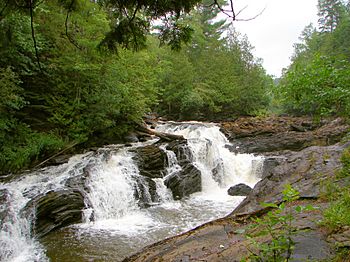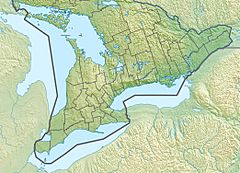York River (Ontario) facts for kids
Quick facts for kids York River |
|
|---|---|

Egan Chute on the York River, near Bancroft
|
|
|
Location of the mouth of the York River in southern Ontario
|
|
| Country | Canada |
| Province | Ontario |
| Regions | |
| Counties |
|
| Physical characteristics | |
| Main source | Yorkend Lake Dysart et al, Haliburton County, Central Ontario 497 m (1,631 ft) 45°18′01″N 78°20′21″W / 45.30028°N 78.33917°W |
| River mouth | Madawaska River Madawaska Valley, Renfrew County, Eastern Ontario 283 m (928 ft) 45°20′08″N 77°34′43″W / 45.33556°N 77.57861°W |
| Basin features | |
| River system | Saint Lawrence River drainage basin |
The York River is a river in Ontario, Canada. It flows through Renfrew County, Hastings County, and Haliburton County. This river is part of the larger Saint Lawrence River drainage basin. This means its waters eventually flow into the Saint Lawrence River. The York River starts in the southern part of Algonquin Provincial Park and ends when it joins the Madawaska River.
Contents
Journey of the York River
The York River begins its journey at Yorkend Lake. This lake is found in the southern part of Algonquin Provincial Park. The park is located in Haliburton County.
Flowing Through Lakes and Towns
As the river flows, it passes through several lakes. These include Branch Lake, Benoir Lake, and Baptiste Lake. After Baptiste Lake, the river enters the town of Bancroft. Here, you can see the Bancroft Light & Power Generating Station and dam.
The river is crossed by major roads like Ontario Highway 28 and Ontario Highway 62 in Bancroft. After leaving Bancroft, the river flows east and northeast.
Waterfalls and Wetlands
Further along its path, the York River features some exciting spots. It flows over Egan Chute and Fram Chute. These are located in Egan Chutes Provincial Park.
The river then enters a special area called the Conroy Marsh. This marsh is a large wetland, covering about 24 square kilometers (9.3 square miles). Wetlands are important natural areas.
Where the River Ends
Finally, the York River joins the Madawaska River. This happens near a community called Mayhews Landing. The Madawaska River then flows into the Ottawa River, and the Ottawa River eventually joins the Saint Lawrence River.
History of the York River
In the late 1800s, the York River was very important for moving logs. Trees cut from the forests along the river were floated down its waters. This was how lumber was transported in those days.
Today, parts of the York River are protected. Some sections are now a provincial waterway park. Other areas, like Egan Chute, are protected as a provincial nature reserve. This helps keep these natural places safe.
Nature Along the River
The York River has a varied landscape. In some places, it flows quickly through narrow, steep-sided areas. In other parts, it moves slowly across flat, sandy areas left behind by glaciers.
These changes in speed and landscape create interesting features. The river's path has formed "ox-bows." These are U-shaped bends in the river. Some old ox-bows have been cut off from the main river. They now form separate ponds and wetlands.
Waterfalls to See
The York River is home to several beautiful waterfalls and rapids:
- Egan Chute
- Farm Chute
- High Falls, Baptiste Lake (This waterfall is less dramatic now because of a dam that controls the water level for Baptiste Lake.)
- High Falls, Benoir Lake
Rivers Joining the York River
Many smaller streams and rivers flow into the York River. These are called tributaries. Here are some of them:
- Little Mississippi River (joins from the right)
- Papineau Creek (joins from the left)
- Alder Creek (joins from the left)
- Salmon Trout Creek (joins from the left)
- Mallard Creek (joins from the right)
- Bresnahan Creek (joins from the left)
- Bentley Creek (joins from the left)
- L'Amable Creek (joins from the right)
- Clark Creek (joins from the right)
- Faraday Creek (joins from the right)
- McGarry Creek (joins Baptiste Lake)
- Hound Creek (joins Baptiste Lake)
- Hudson Creek (joins Baptiste Lake)
- Hamilton Creek (joins Baptiste Lake)
- Lighthouse Creek (joins Baptiste Lake)
- Chainy Creek (joins Baptiste Lake)
- Elephant Creek (joins from the right)
- Allen Creek (joins Benoir Lake)
- Fourcorner Creek (joins Benoir Lake)
- Kingscote Creek (joins Benoir Lake)
- Mink Creek (joins from the left)
- North York River (joins from the left)
- Clyde Creek (joins from the left)
See also
 In Spanish: Río York (Ontario) para niños
In Spanish: Río York (Ontario) para niños
 | William L. Dawson |
 | W. E. B. Du Bois |
 | Harry Belafonte |


